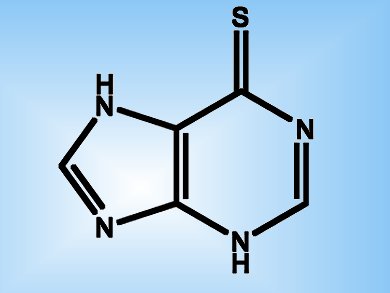Acute lymphoblastic leukemia (ALL) is an aggressive blood cancer. The current treatment for this disorder consists of a high dose chemotherapy which is followed by a maintenance therapy with nucleoside analogs, such as 6-mercaptopurine (pictured) or 6-thioguanine. Due to unknown mechanisms, however, 50 % of adult patients become resistant to these cures and relapse.
According to Gannie Tzoneva, Columbia University, New York, USA, and colleagues the reason behind this phenomenon is the hyper-activation of the enzyme cytosolic 5’-nucleotidase II (NT5C2). The researchers discovered that this protein, which is able to inactivate 6-mercaptopurine and 6-thioguanine, is mutated in patients undergoing relapse. The mutated enzymes have an altered allosteric regulation which dramatically increases their catalytic activity and renders leukemic cells resistant to the action of nucleoside analogs. NT5C2 is, thus, a major mediator of drug resistance in relapsed ALL patients.
- Activating mutations in the NT5C2 nucleotidase gene drive chemotherapy resistance in relapsed ALL,
G. Tzoneva, A. Perez-Garcia, Z. Carpenter, H. Khiabanian, V. Tosello, M. Allegretta, E. Paietta, J. Racevskis, J. M. Rowe, M. S. Tallman, M. Paganin, G. Basso, J. Hof, R. Kirschner-Schwabe, T. Palomero, R. Rabadan, A. Ferrando,
Nat. Med. 2013, 19(3), 368–371.
DOI: 10.1038/nm.3078



